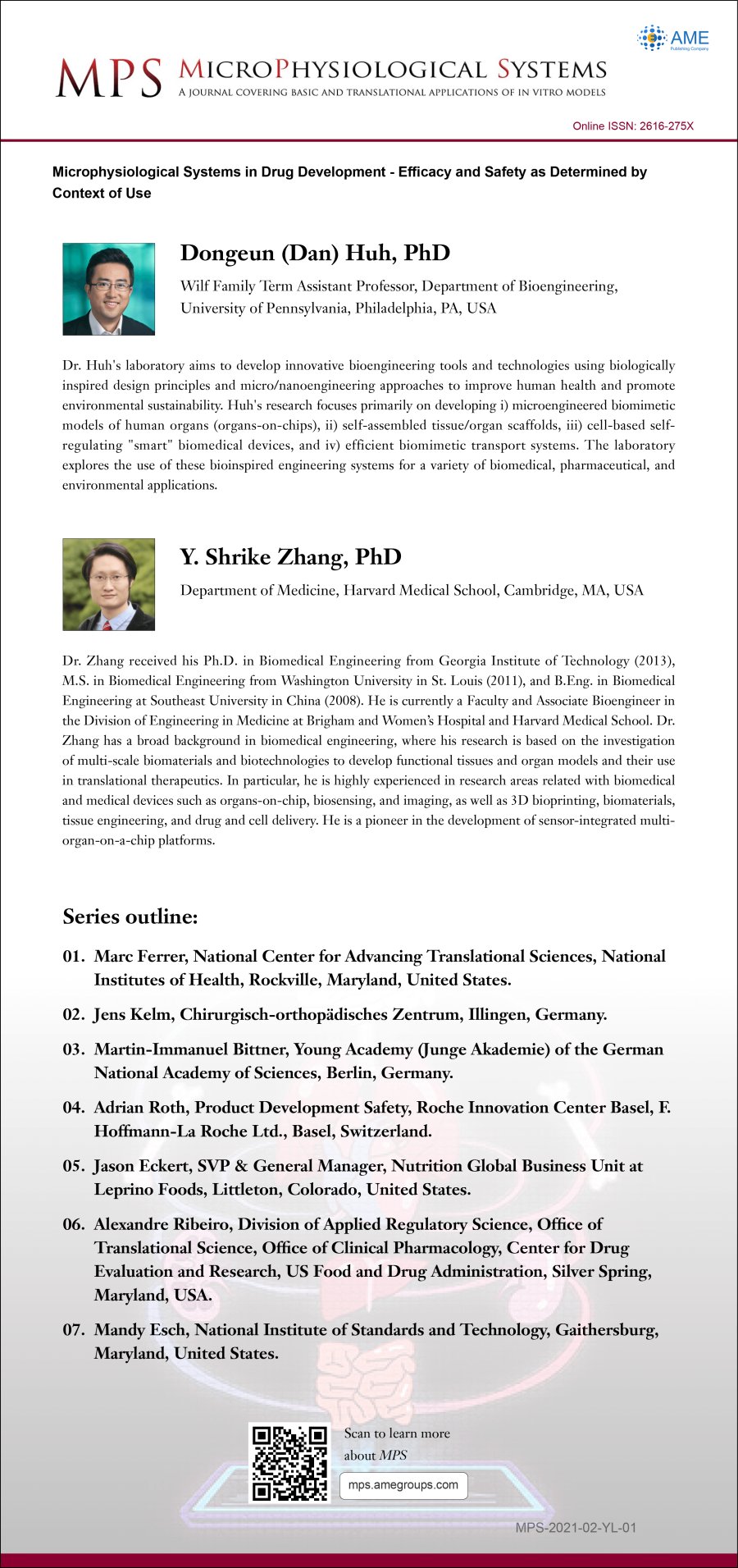
This special series on “Microphysiological Systems in Drug development - Efficacy and Safety as Determined by Context of Use” is guest-edited by Dr. Dongeun (Dan) Huh from University of Pennsylvania and Dr. Yu Shrike Zhang from Harvard Medical School, and aims to reflect the updated overview of the most recent acquisitions and future perspectives.
Dr. Dongeun (Dan) Huh, PhD
Wilf Family Term Assistant Professor, Department of Bioengineering, University of Pennsylvania, Philadelphia, PA, USA
Dr. Huh's laboratory aims to develop innovative bioengineering tools and technologies using biologically inspired design principles and micro/nanoengineering approaches to improve human health and promote environmental sustainability. Huh's research focuses primarily on developing i) microengineered biomimetic models of human organs (organs-on-chips), ii) self-assembled tissue/organ scaffolds, iii) cell-based self-regulating "smart" biomedical devices, and iv) efficient biomimetic transport systems. The laboratory explores the use of these bioinspired engineering systems for a variety of biomedical, pharmaceutical, and environmental applications.
Dr. Y. Shrike Zhang, PhD
Department of Medicine, Harvard Medical School, Cambridge, MA, USA
Dr. Zhang received his Ph.D. in Biomedical Engineering from Georgia Institute of Technology (2013), M.S. in Biomedical Engineering from Washington University in St. Louis (2011), and B.Eng. in Biomedical Engineering at Southeast University in China (2008). He is currently a Faculty and Associate Bioengineer in the Division of Engineering in Medicine at Brigham and Women’s Hospital and Harvard Medical School. Dr. Zhang has a broad background in biomedical engineering, where his research is based on the investigation of multi-scale biomaterials and biotechnologies to develop functional tissues and organ models and their use in translational therapeutics. In particular, he is highly experienced in research areas related with biomedical and medical devices such as organs-on-chip, biosensing, and imaging, as well as 3D bioprinting, biomaterials, tissue engineering, and drug and cell delivery. He is a pioneer in the development of sensor-integrated multi-organ-on-a-chip platforms.
Series outline:
- Marc Ferrer, National Center for Advancing Translational Sciences, National Institutes of Health, Rockville, Maryland, United States.
- Jens Kelm, Chirurgisch-orthopädisches Zentrum, Illingen, Germany.
- Martin-Immanuel Bittner, Young Academy (Junge Akademie) of the German National Academy of Sciences, Berlin, Germany.
- Adrian Roth, Product Development Safety, Roche Innovation Center Basel, F. Hoffmann-La Roche Ltd., Basel, Switzerland.
- Jason Eckert, SVP & General Manager, Nutrition Global Business Unit at Leprino Foods, Littleton, Colorado, United States.
- Alexandre Ribeiro, Division of Applied Regulatory Science, Office of Translational Science, Office of Clinical Pharmacology, Center for Drug Evaluation and Research, US Food and Drug Administration, Silver Spring, Maryland, USA.
- Mandy Esch, National Institute of Standards and Technology, Gaithersburg, Maryland, United States.
Disclosure:
The special series “Microphysiological Systems in Drug development - Efficacy and Safety as Determined by Context of Use” was commissioned by the editorial office, Microphysiological Systems without any funding or sponsorship. YSZ serves as the Editor-in-Chief of Microphysiological Systems and served as the unpaid Guest Editor of the series. DH serves as the Co-Editor-in-Chief of Microphysiological Systems from April 2022 to March 2024 and served as the unpaid Guest Editor of the series.

